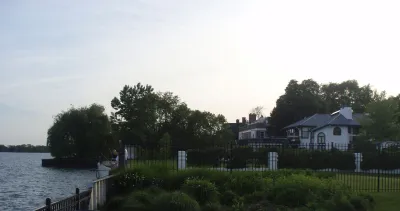Strict zoning policies keep housing unaffordable. But there are strategies governments can implement to change exclusionary housing policies and promote the construction of more affordable housing.

Grosse Pointe Park, Michigan—a suburban community east of Detroit—and Hudson, Ohio—located between Akron and Cleveland—are 200 miles apart and in different states. But the two communities share a distinction: they belong to a cohort of the nation’s most exclusionary cities and towns. This means that, despite considerable demand from would-be new residents to live there, they have mounted barriers to new housing construction through overly restrictive land use rules. Between 2000 and 2020, Grosse Pointe Park permitted only 54 new housing units—meaning its new housing is growing at only a tenth of the rate of new construction in the surrounding metro area.
Like many other local governments, Grosse Pointe Park’s and Hudson’s governments have considerable control over their land use regulations. They are entitled by their respective states to set zoning rules that limit housing construction, particularly of units affordable to low-income families. The consequences of such regulations extend beyond a simple lack of housing supply. By excluding people, restrictive zoning policies allow communities to hoard resources—meaning that they can restrict the use and benefits of their public services, like schools and parks, to wealthier residents who are also more likely to be white. Both of the suburbs—illustrative of many other exclusionary communities nationwide—have populations that are overwhelmingly white, with median household incomes double those of their respective metropolitan areas.
The states and the federal government could take steps to encourage more equitable policies in these types of cities. Our new research shows that higher-level governments have some options, including conditioning grant awards on improved land use policies to promote new housing construction and equitable outcomes—especially in communities whose budgets significantly depend on federal and state funding.
But this approach won’t work in communities that don’t rely as much on federal or state funding or that are willing to refuse it in order to preserve their exclusive land use rules. That’s why the best strategy is one that connects a variety of approaches aimed at improving housing affordability, limiting restrictive zoning rules, and increasing the housing supply.
Exclusionary Communities Are Often Hostile to New Housing Construction
In many towns and cities in the U.S., residents and policymakers are opposed to new housing construction, particularly when it involves anything other than single-family homes. Grosse Pointe Park and Hudson allow only single-family homes to be built on 84 percent and 85 percent of their residential land, respectively.
See source article to continue reading.
FULL STORY: Federal and State Dollars Could Be Used to Force Change in Exclusionary Towns

Analysis: Cybertruck Fatality Rate Far Exceeds That of Ford Pinto
The Tesla Cybertruck was recalled seven times last year.

National Parks Layoffs Will Cause Communities to Lose Billions
Thousands of essential park workers were laid off this week, just before the busy spring break season.

Retro-silient?: America’s First “Eco-burb,” The Woodlands Turns 50
A master-planned community north of Houston offers lessons on green infrastructure and resilient design, but falls short of its founder’s lofty affordability and walkability goals.

Test News Post 1
This is a summary

Analysis: Cybertruck Fatality Rate Far Exceeds That of Ford Pinto
The Tesla Cybertruck was recalled seven times last year.

Test News Headline 46
Test for the image on the front page.
Urban Design for Planners 1: Software Tools
This six-course series explores essential urban design concepts using open source software and equips planners with the tools they need to participate fully in the urban design process.
Planning for Universal Design
Learn the tools for implementing Universal Design in planning regulations.
EMC Planning Group, Inc.
Planetizen
Planetizen
Mpact (formerly Rail~Volution)
Great Falls Development Authority, Inc.
HUDs Office of Policy Development and Research
NYU Wagner Graduate School of Public Service




























